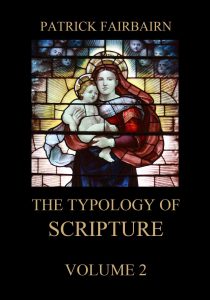The Typology of Scripture Volume 2 – Patrick Fairbairn
There are few topics connected with Biblical interpretation, which seem to be more in need of re-investigation. The old opinions have gone out of vogue, without being replaced by any better, or indeed by any other system, so that the whole subject has been long in a most unsettled state. This would be no great evil if typology were merely a matter of curious speculation; but embracing as it does some of the most difficult and interesting questions of interpretation, its perversion or neglect cannot fail to be attended by the most pernicious consequences. Under these impressions, which have long been forming, in this book the difficulties of the subject are distinctly recognized and fairly appreciated. The author is acquainted with the history of his subject. .He does not come to the discussion of it, with a few ex parte notions gathered from some recent writer. He knows not only where the difficulty lies, but what attempts have heretofore been made for its removal. This is volume two out of two.
Format: Paperback.
The Typology of Scripture Volume 2.
ISBN: 9783849677893.
Available at amazon.com and other venues.
Biography of Patrick Fairbairn (from wikipedia.com)
He was born in Greenlaw, Berwickshire, and began studying at the University of Edinburgh at the age of 13. He graduated in 1826 and commenced work as a tutor in Orkney. Fairbairn was granted the living of North Ronaldshay in 1830 and remained there for six years. After that time, he pastored churches in Bridgeton, Glasgow, and Salton, East Lothian.
After the Disruption of 1843, Fairbairn joined the Free Church of Scotland. In 1853, the General Assembly appointed him Professor of Theology at the Free Church Theological College in Aberdeen. When the Free Church College was founded in Glasgow in 1856, Fairbairn became its Principal and Professor of Church History and Exegesis—positions he held until his death in 1874. He was elected Moderator of the General Assembly in 1864.
In 1845, Fairbairn wrote The Typology of Scripture. MacLehose (1886) noted that this was “one of the most important theological works of its day,” and suggested that it “appeared at a time when Scotland was singularly barren in theological scholarship, and gained for its author a great reputation, not only in his own country but also in England and America.”
Fairbairn’s work on typology was followed by Prophecy viewed in its Distinctive Nature, its Special Functions, and Proper Interpretation (1856) and Hermeneutical Manual; or, Introduction to the exegetical study of the Scriptures of the New Testament (1858). He also wrote commentaries on Ezekiel and the Pastoral epistles, and edited the Imperial Bible Dictionary.
Fairbairn was “large and imposing in appearance,” but “modest and retiring in his habits and feelings.” He was married three times, but little is known of his private life because Fairbairn “asked his friends not to allow his biography to be written, and destroyed letters and other documents which might have led them to a disregard of his wish.”
Walker (1964) suggested that Fairbairn’s “zeal for ascertaining and propagating the truth of God … continued steadfastly with all the vigour of his powerful intellect until the closing days of his life.”
He is buried against the north wall of the Grange Cemetery in Edinburgh with his wives Mary Playfair (1808-1852) and Frances Eliza Turnbull (1928-1903).
Publisher’s Note: This book is printed and distributed by Createspace a DBA of On-Demand Publishing LLC and is typically not available anywhere else than in stores owned and operated by Amazon or Createspace.

